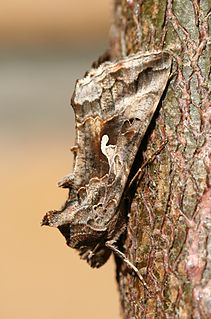
Plusiinae is a smallish subfamily of the moth family Noctuidae. As the Noctuidae appear to be a paraphyletic assemblage, the Plusiinae may eventually be raised to family status.

Syngrapha is a genus of moths of the family Noctuidae.

Syngrapha ain is a moth of the family Noctuidae.

Syngrapha rectangula, the salt and pepper looper or angulated cutworm, is a moth of the family Noctuidae. The species was first described by William Kirby in 1837. It is found in Newfoundland, Quebec, northern Ontario to Manitoba, New Jersey, northern Pennsylvania, southern Michigan, northern Wisconsin, North Carolina, Virginia, British Columbia, Alberta, Montana, northern Idaho and the Cascades.
Syngrapha abstrusa, the abstruse false looper, is a moth of the family Noctuidae. It is found from Newfoundland to New Jersey, Southern Canada, Montana and Northern New Mexico.
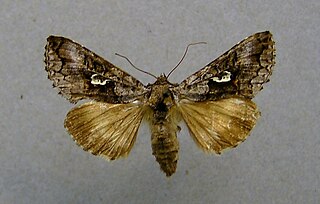
Syngrapha interrogationis, the scarce silver Y, is a moth of the family Noctuidae. It is found in the northern areas of the world, from Alaska, through Canada, Iceland, Europe, Siberia up to Northeast Asia including Japan.
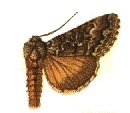
Syngrapha alias, the hooked silver Y, is a moth of the family Noctuidae. It is found in from Newfoundland to Alaska and Vancouver Island, north to near the treeline and south in the west to coastal north California and Arizona, in the east to North Carolina.
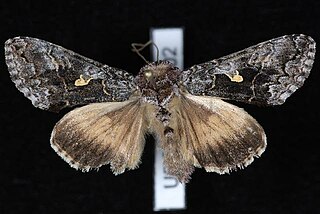
Syngrapha celsa, the plain silver Y or western conifer looper, is a moth of the family Noctuidae. The species was first described by Henry Edwards (entomologist) in 1881. It is found in North America from British Columbia to California, Idaho, Nevada, Arizona and New Mexico.

Syngrapha altera is a moth of the family Noctuidae. It is found from Newfoundland to Manitoba and Northern Michigan.
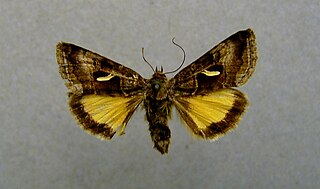
Syngrapha hochenwarthi is a moth of the family Noctuidae. It is found in the Alps, the mountainous areas of Northern Norway and Finland, the Ural mountains, the Balkan, the Caucasus and the Altai mountains.
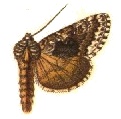
Syngrapha u-aureum, the golden looper moth, is a moth of the family Noctuidae. It is found from eastern Manitoba to Quebec, Labrador, southern Greenland, Newfoundland, northern Maine, northern New Hampshire and northern New York.

Syngrapha microgamma is a moth of the family Noctuidae. It is found in much of Canada south in the east to southern Maine, northern New York, and the Great Lakes States. In Europe, it is found from Fennoscandia and central Europe east to mountains eastern Asia.

Syngrapha epigaea, the pirate looper moth or narrow silver Y, is a moth of the family Noctuidae. It is found from coast to coast in Canada south in the east Pennsylvania, Ohio, and the northern Great Lakes States.
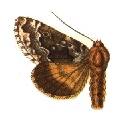
Syngrapha angulidens is a moth of the family Noctuidae. It is found from Alaska south in the mountains to northern Oregon, western Nevada, Arizona and New Mexico and east to Colorado, western Wyoming, Montana and Alberta.
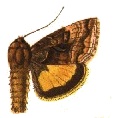
Syngrapha ignea, the mountain beauty, is a moth of the family Noctuidae. It is found from northern Alaska south to southern California and New Mexico, with a disjunct population in Labrador. It is also found sparingly across the boreal forest and the subarctic.
Syngrapha borea is a species of looper moth in the family Noctuidae. It is found in North America.
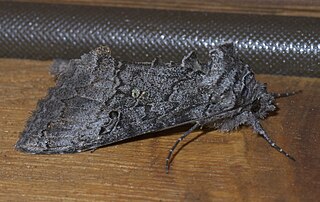
Syngrapha viridisigma, known generally as the spruce false looper or green-marked looper, is a species of looper moth in the family Noctuidae. It is found in North America.
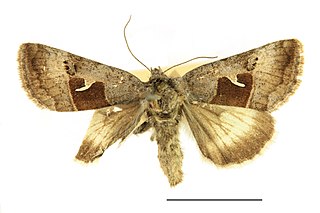
Syngrapha parilis is a species of looper moth in the family Noctuidae. It is found in North America.
Syngrapha cryptica is a species of looper moth in the family Noctuidae. It is found in North America.
















